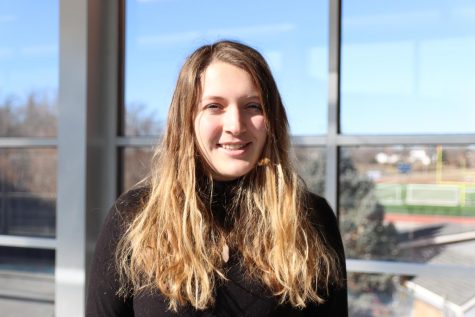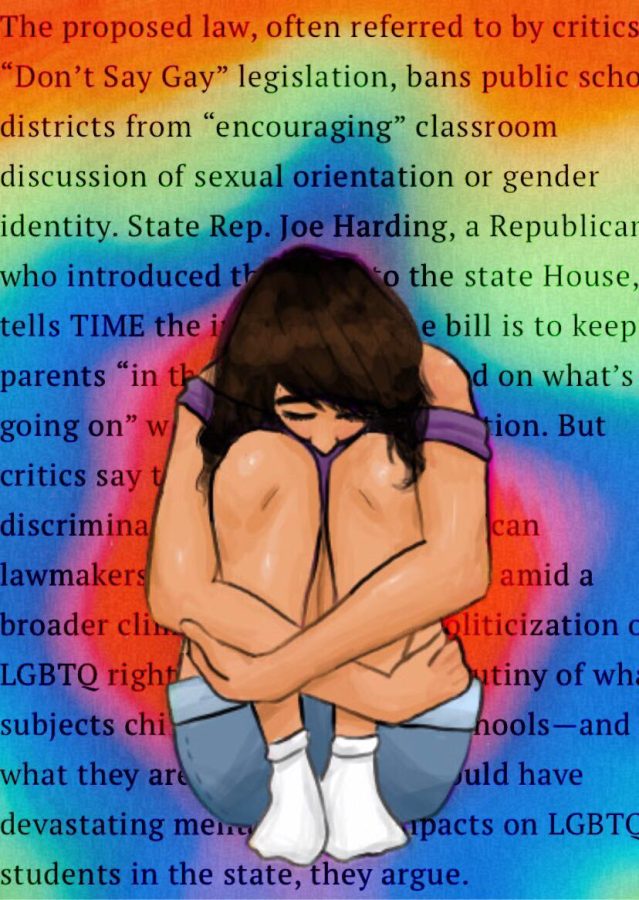Opinion: The ‘Don’t Say Gay’ Bill Cannot Become A Nationwide Trend
Media by Emma Tyulyayev
The Florida “Don’t Say Gay” bill, as it has been nicknamed, is a detriment to the mental health of young LGBTQ+ students.
Terrified — that’s the way I felt when agonizing over whether to tell my parents I was gay.
Unsure of what to say and scared they would never see me the same way again, my only comfort in these moments of indecision was knowing I would be the one responsible for if and when I chose to share this part of myself with them.
A recent Florida bill, known informally as the “Don’t Say Gay” bill (House bill 1557), would take this choice away from struggling teenagers.
Not only would the bill require school principals to disclose a student’s sexual orientation to parents within the first six weeks the school is made aware of it, but it also would ban school districts from “discussion about sexual orientation or gender identity in primary grade levels or in a manner that is not age-appropriate or developmentally appropriate for students.”
Though my parents were accepting of my sexuality, this is not always the case, and some teens may be unsure if they would be allowed to continue living at home, should they come out.
The amendment of the bill that sets guidelines about disclosing a child’s sexual orientation has been withdrawn due to an outpouring of community hate and comments from President Joe Biden himself, calling the bill “hateful.” However, it is one of many amendments that make up the bill as a whole. The bill itself is still set to be voted on and would go into effect July 1.
Such legislation brings nationwide concerns for the safety of LGBTQ+ students, as this trend-setting act by the Florida government has the potential to create a domino effect.
RSD has made strides in recent years toward improving the LGBTQ+ resources available to students, such as including pronouns in Infinite Campus, but school districts would be at the mercy of the state government if a similar law was passed in Missouri.
We can not let this become the case.
Dr. Daniel Hurewitz, associate professor of history at Hunter College, works with students studying to become teachers and educates them on the importance of including LGBTQ+ curriculum in schools.
Though Dr. Hurewitz said he would hope there would be enough opposition to stop this from becoming a nationwide trend, there really is no way to tell the potential consequences of such a bill, should it pass.
“The fact that it feels so accepted, at least in much of the country, makes me feel like it would be hard to turn that page back,” Dr. Hurewitz said. “It seems like it would be hard to fully undo that cultural shift.”
Though the bill focuses on students in primary grades, Dr. Hurewitz said it is important to include LGBTQ+ history in school for students of all ages.
“There’s LGBTQ history going all the way back to the beginning of this country,” Dr. Hurewitz said. “Many of the poets and the singers and the songwriters of [the Great Depression] era were also part of an LGBTQ world. Without having to devote a whole class to talking specifically about ‘oh and this is a gay part of American history,’ they [could] just add it in to the mix.”
Dr. Hurewitz said adding even a little more representation to the curriculum can vastly improve LGBTQ+ students’ mental health. Making this change to RSD classrooms would be beneficial, as it gives students a chance to see themselves represented in the curriculum.
“It seems a mistake to me to think that by not having this curriculum you’ll somehow shield those kids from the world they’re in,” Dr. Hurewitz said. “In fact it’s doing the opposite. It’s not preparing them to enter the world.”
Your donation will support the student journalists of Marquette High School. Your contribution will allow us to purchase equipment and cover our annual website hosting costs. You may become a PATRON by making a donation at one of these levels: White/$30, Green/$50, Blue/$100. Patron names will be published in the print newsmagazine, on the website and once per quarter on our social media accounts.

Marin Ellington (she/her), senior, is the Editor in Chief of the Marquette Messenger. In addition to her involvement in student journalism at Marquette,...

Emma Tyulyayev is an Illustrator for the Marquette Messenger. This is her second year on staff. After school, she enjoys driving around and going on frequent...







